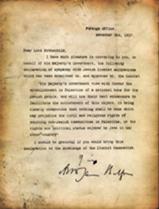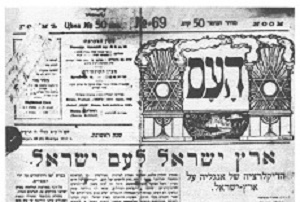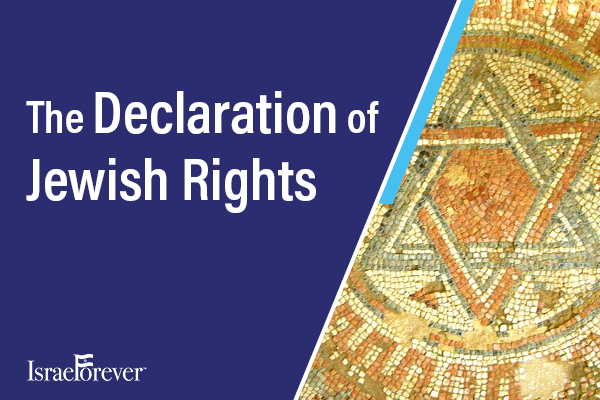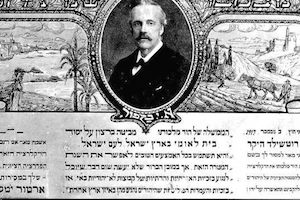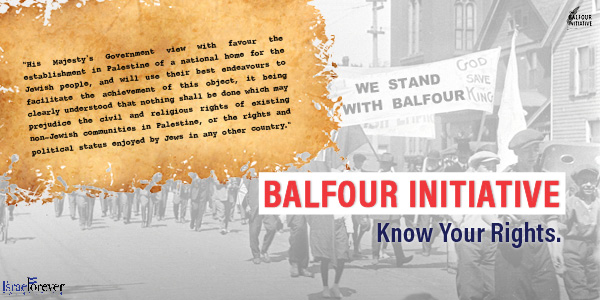Six Facts You Must Know About The Balfour Declaration and the Right to a Jewish National Homeland
Amidst the tensions surrounding the centenary of the Balfour Declaration, The Ministry of Foreign Affairs outlined 6 facts surrounding the event and its significance and relevance at the time of the declaration’s emergence into the public sphere.
Whether you are a history buff, an avid Israel advocate, or just want to have the facts straight, here are the cliffnotes to help you out.
The Balfour Declaration
1. The Jewish people are indigenous to the land of Israel and have had a continual presence there for millennia. Jews have been striving to reconstitute their national homeland since the destruction of the Judean Kingdom in 70 CE. The successful fulfillment of this goal began in the 19th century.
As conceptualized by Theodor Herzl in his book “The Jewish State” in 1896, the political movement to return to the Jewish homeland began to establish national institutions at the Zionist Congress in 1897.
2. The Balfour Declaration was one of the earliest measures taken by a major international actor to recognize the right of the Jewish people to re-establish sovereignty over their national homeland.

Issued on 2 November 1917 by the British Foreign Secretary, Lord Arthur James Balfour, the declaration states:
“His Majesty's Government view with favour the establishment in Palestine* of a national home for the Jewish people, and will use their best endeavors to facilitate the achievement of this object, it being clearly understood that nothing shall be done which may prejudice the civil and religious rights of existing non-Jewish communities in Palestine or the rights and political status enjoyed by Jews in any other country.”
[*It is important to note that “Palestine” referred at the time to the geographic area, not to any political entity as no such independent or sovereign entity existed.]
Recognition by the Internal Community
3. International recognition of the Jewish people’s inalienable right to reestablish sovereignty in its ancestral homeland quickly followed the Balfour Declaration.
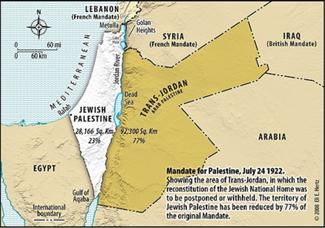
Most significantly, the League of Nations [the precursor to the United Nations] recognized this right in its 24 May 1922 decision to establish the Palestine/Land of Israel Mandate. In that international legislative act, the League appointed Great Britain to be responsible for putting the Balfour Declaration into effect, with the goal of “the establishment in Palestine of a national home for the Jewish people.” The legally-binding League of Nations Mandate acknowledged the “historic connection of the Jewish people” to the area rightly known as the Land of Israel/Judea/the Holy Land.
The League of Nations mandate of 1922 transformed the Balfour Declaration and its call for the establishment of a national home for the Jewish people from a policy position into an international legal obligation accepted by the international community as a whole.
Recognition in the Mandatory Document
4. This recognition is clearly stated in the Mandatory document:
“Whereas recognition has thereby been given to the historical connection of the Jewish people with Palestine and to the grounds for reconstituting their national home in that country.” [Preamble]
“The Mandatory shall be responsible for placing the country under such political, administrative and economic conditions as will secure the establishment of the Jewish national home, as laid down in the preamble, and the development of self-governing institutions, and also for safeguarding the civil and religious rights of all the inhabitants of Palestine, irrespective of race and religion.” [Article 2]
Legitimate Jewish Rights
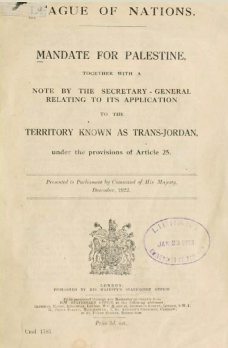
5. The importance of both the Balfour Declaration and the League of Nations decision lays in the international recognition of preexisting natural, historical, and legal rights of the Jewish people to their homeland, in which there had been a continuous Jewish presence throughout the centuries.
The official acknowledgment by the international community of the Jewish people’s historic ties to the land is further emphasized by the language used in the League’s Mandate decision. The Palestine/Land of Israel Mandate specifically calls to “reconstitute” the national home of the Jewish people, not to constitute anything new.
The International Community and the Establishment of the State of Israel
6. The Balfour Declaration, the League of Nations decision and the subsequent United Nations Partition Plan of 1947 all recognized the Jewish people’s right to a sovereign state in its historic homeland.
These international decisions played an important role in galvanizing support for the establishment of the future State of Israel.


